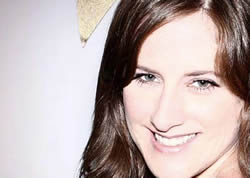Alexandra Ossola* believes that women will succeed in leadership more by becoming more confident, honest and interesting.
 Three phone interviews, two coffees, a lunch, and a dinner—that’s a fairly typical day for Laura Sapp (pictured), the recently-named head of talent at IAC (InterActiveCorp).
Three phone interviews, two coffees, a lunch, and a dinner—that’s a fairly typical day for Laura Sapp (pictured), the recently-named head of talent at IAC (InterActiveCorp).
The media and entertainment firm, which includes online brands like Vimeo, Tinder, OKCupid, and the Daily Beast, saw its year-on-year revenue increase by more than 23% in 2018.
With more than 8,000 employees across 60 companies, “that type of growth doesn’t happen unless you know how to grow, cultivate, and retain talent,” Sapp believes, in a culture which “rewards ambition, curiosity, and healthy debate.”
To find people who fit the bill, Sapp will start by talking to the CEOs of IAC’s brands to get a sense of what they want out of a new hire, “building a relationship with them and really understanding what they’re looking for.”
Half of those CEOS are are women.
That sets the company apart from its competitors—women led just 6% of Fortune 500 companies in 2018.
Because she’s got the C-suite’s ear and spends much of her time talking with potential hires, Sapp has a unique insight into how women snag coveted leadership roles. We’ve distilled her advice to three main suggestions.
Be confident
“Women sometimes don’t sell themselves as strongly as I think they could.
They don’t want to say, ‘I owned this project, I was the one who put this over the finish line,’ out of fear that would be bragging,” Sapp says.
Sapp shares an anecdote from an interview where the candidate described a big project at her current employer as a “collective effort.”
“I said, ‘But whose name was attached?’
She finally said, ‘It would be mine.’
I appreciate the humbleness, but there is a balance,” Sapp says.
“I want women to be able to say, ‘This was me, as well as the team I brought together.’”
It’s an interview, after all—if you don’t sell yourself, who will?
Be honest
It’s a sad reality that women don’t get promoted as often as men.
There are lots of possible reasons for this, only some of which are within a woman’s control.
One way to boost your chances, Sapp says, is to make sure the higher-ups know you are interested in moving up.
“Make sure you are raising your hand and that people know you have an interest in leadership positions,” Sapp advises.
“Ask them for an honest assessment of where you are now and what it would take to get into the role you want. Figure out how to bridge that gap.”
Honesty is also important for women looking for work after taking some time off.
Whether it was a year to care for a newborn, six months to look after an ailing parent, or two years of traveling to “recharge,” candidates would do better to be upfront with a recruiter about what might appear to be gaps in a resume.
Be interesting
Your relationship with a company begins the second you submit your application, Sapp says.
“It’s a great opportunity for you to put your best foot forward, to make it possible to get in the door.”
Sapp loves to read the “other skills” section some people put at the bottom of their resume, because it could indicate “soft skills” that distinguish a candidate.
She recalls a conversation with one candidate about her preparation for a marathon.
“The training it took to get there, the discipline—she had to wake up at 4:30 to run, even in the dark!
That [section] can highlight skills that might parlay into a great conversation with the recruiter.”
“I’m a human on the other side of the phone,” Sapp says.
“I am looking for folks that I can connect with as much as they might want to connect. To find the next opportunity, start with the moment that phone call begins.”
* Alex Ossola is the Deputy Special Projects editor at Quartz. She tweets at @ossolalex and her website is alexandraossola.com.
This article first appeared at qz.com.











